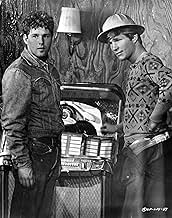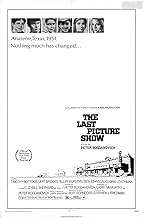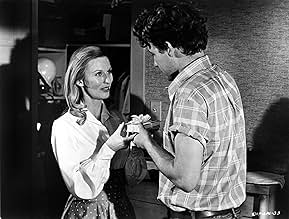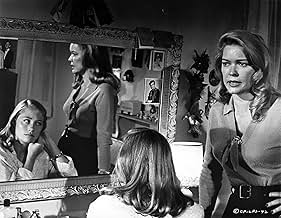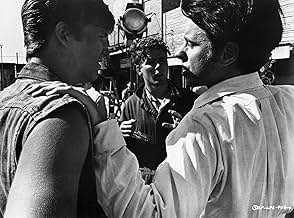Em 1951, um grupo de estudantes do ensino médio chegou à idade adulta em uma cidade desolada, isolada e atrofiada no norte do Texas que está morrendo lentamente, tanto cultural como economic... Ler tudoEm 1951, um grupo de estudantes do ensino médio chegou à idade adulta em uma cidade desolada, isolada e atrofiada no norte do Texas que está morrendo lentamente, tanto cultural como economicamente.Em 1951, um grupo de estudantes do ensino médio chegou à idade adulta em uma cidade desolada, isolada e atrofiada no norte do Texas que está morrendo lentamente, tanto cultural como economicamente.
- Direção
- Roteiristas
- Artistas
- Ganhou 2 Oscars
- 19 vitórias e 22 indicações no total
- Charlene Duggs
- (as Sharon Taggart)
Avaliações em destaque
The story centers around two best friends, Sonny (Timothy Bottoms) and Duane (Jeff Bridges), as they pass from being high school seniors into adult life. Given their backgrounds, coming from broken homes and living in boarding houses, there is little idea that they will go to college. The movie details how the two handle this pivotal and bewildering time from being on the high school football team one year to being on their own without much of a safety net the next. In a wider context the movie is about larger transitions: from youth to adulthood for the young people, from a frustrated and bored middle age to an even less promising future for the older folks, and from a town with some social cohesiveness to a town dealing with the isolating effects of a bankrupt economy and the advent of television. The rather bleak prospects that Sonny and Duane face parallel the prospects of the town. You are made to think about transitions in your own life.
The movie is populated with many finely drawn characters, all acted with supreme skill. There is not a false note struck in the entire movie. By the end we know the characters so well that they seem real. Jeff Bridges was nominated for an Oscar, and I don't understand why Timothy Bottoms was not nominated as well, since his performance is of equal quality. Bottoms plays Sonny with such genuine good-natured charm and honest sincerity that it is hard to believe he is acting. And Ben Johnson and Cloris Leachman both won well-deserved Oscars. Kudos all round to the entire cast.
The movie is beautifully filmed in black and white befitting the stark settings and story, and the time period. It is filmed as if it were made in the period portrayed.
If you have ever lived in a small town or if you grew up in the American heartland in the 1950s, this movie will evoke overwhelming nostalgia. But the story is so powerfully told that I think that for everyone it will evoke nostalgia for a time and place, even for that which they may never have known.
The town, as well as the movie, is held together by Sam the Lion (Ben Johnson) who owns the movie theater, the café, and the pool hall. In fact he owns just about everything there is to do in Anarene, except for watching the hapless Anarene High football team ... and sex. It is no wonder then that sex, in its many faceted varieties, plays a big role in this town, and in this movie.
There are so many wonderful and memorable scenes that it would simply require a small volume to recount them. One scene that grabbed me was when Sam and Sonny are at a lake outside of town, ostensibly fishing, and Sam reminiscences about old times, about when he came to the lake twenty years earlier with a lover. Sam makes the comment, "You wouldn't believe how this land has changed." The camera pans the surroundings and it is hard to see how this area could have changed much in the last thousand years, but Sam is clearly attuned to the subtle changes, since memories were impressed on him in a time of strong emotion. We all have clear memories from when and where we have been happy, even if it is a small lake in a desolate flat land. And Sam's specific comment can be taken to apply more generally to the basic theme of the movie. This incredible scene ends with Sam's saying, "Being a decrepit old bag of bones, that's what's ridiculous," and anyone who is not close to tears at that point will never truly appreciate the beauty of this movie.
Seemingly this movie should be depressing, but the effect is more of a melancholic look into the lives of ordinary people who are just trying to play the hands they have been dealt in life.
It wasn't until the movie was over and I was reading the credits that I realized how cleverly the music had been woven into the film. All of the music is from the time period and is a part of the action and not background music. It is played on home radios, car radios, truck radios, 45 rpm players, jukeboxes, and at a community Christmas dance. The Hank Williams song, heard on the radio in Sonny's old truck in the opening scene, "Why Don't You Love Me Like You Used to Do?" sets the tone for the music as well as the movie. There are great songs taken from over a dozen country and western classics from the era. Ruth (Cloris Leachman) is listening to Johnny Standley's quirky, "It's in the Book," (a unique and strangely satirical offering to be popular at any time, let alone reach the pop charts and sell a million records in 1952) during the final scene between her and Sonny.
Why is this movie so special? That's kind of like asking why one likes a certain piece of music or a painting. Everything comes together here in one of those magic moments - the acting, the filming, the story, the music, the editing - to create a simply-told and remarkably affecting work of art.
In the hands of lesser talents, the subject matter of unimportant people doing unimportant things might have yielded a tiresome soap opera. But the film's script is poetic, the direction is skillful, the B&W cinematography is artistic, the casting is perfect, and the performances are superlative.
The story draws heavily from early American individualism. Life here is mostly physical, not mental. Human relationships are direct, immediate, one-on-one. Except for schools, which are given some prominence, cultural institutions exist in the film only vaguely or not at all. For entertainment, people listen to radio, which features the mournful country-western music of Hank Williams. Or, they go to the town's decrepit picture show, where an elderly Miss Mosey kindly returns money to the kids who got there too late to see the cartoons.
If the film has a weakness it is in the presentation of a realism that is incomplete. We see mostly stifling bleakness, though that is ameliorated somewhat by humor. What we don't see are the uplifting influences and the optimism that sustained agrarian generations through hardships and rough times.
Nevertheless, within the film's story parameters, the film does convey an accurate account of what life was like for ordinary folks in West Texas in the early 1950s. I doubt that this film could be made today. Contemporary audiences have been conditioned to expect non-stop action, loudness, glitz, and overblown special effects, all of which are absent, mercifully, from this film.
Low-key, perceptive, bleak, and melancholy, "The Last Picture Show" easily makes my list of Top Ten favorite films of all time.
Você sabia?
- CuriosidadesAt 9 minutes and 54 seconds, Ben Johnson's performance in this movie is the shortest ever to win an Academy Award for Best Supporting Actor.
- Erros de gravaçãoThe lavalier mic on Duane's tie is visible during the graduation scene.
- Citações
Sam the Lion: You boys can get on out of here, I don't want to have no more to do with you. Scarin' a poor, unfortunate creature like Billy just so's you could have a few laughs - I've been around that trashy behavior all my life, I'm gettin' tired of puttin' up with it. Now you can stay out of this pool hall, out of my cafe, and my picture show too - I don't want no more of your business.
- Versões alternativasSpecial edition includes seven minutes of footage not included in the original release.
- ConexõesFeatured in The Last Picture Show Re-Release Promo (1971)
- Trilhas sonorasCold, Cold Heart
(uncredited)
Written by Hank Williams (as Hank Williams Sr.)
Performed by Tony Bennett
Principais escolhas
Detalhes
- Data de lançamento
- País de origem
- Idioma
- Também conhecido como
- La Última Película
- Locações de filme
- 605 South Ash Street, Archer City, Texas, EUA(high school)
- Empresas de produção
- Consulte mais créditos da empresa na IMDbPro
Bilheteria
- Orçamento
- US$ 1.300.000 (estimativa)
- Faturamento bruto nos EUA e Canadá
- US$ 29.133.000
- Faturamento bruto mundial
- US$ 29.146.255
- Tempo de duração1 hora 58 minutos
- Cor
- Mixagem de som
- Proporção
- 1.85 : 1
Contribua para esta página






